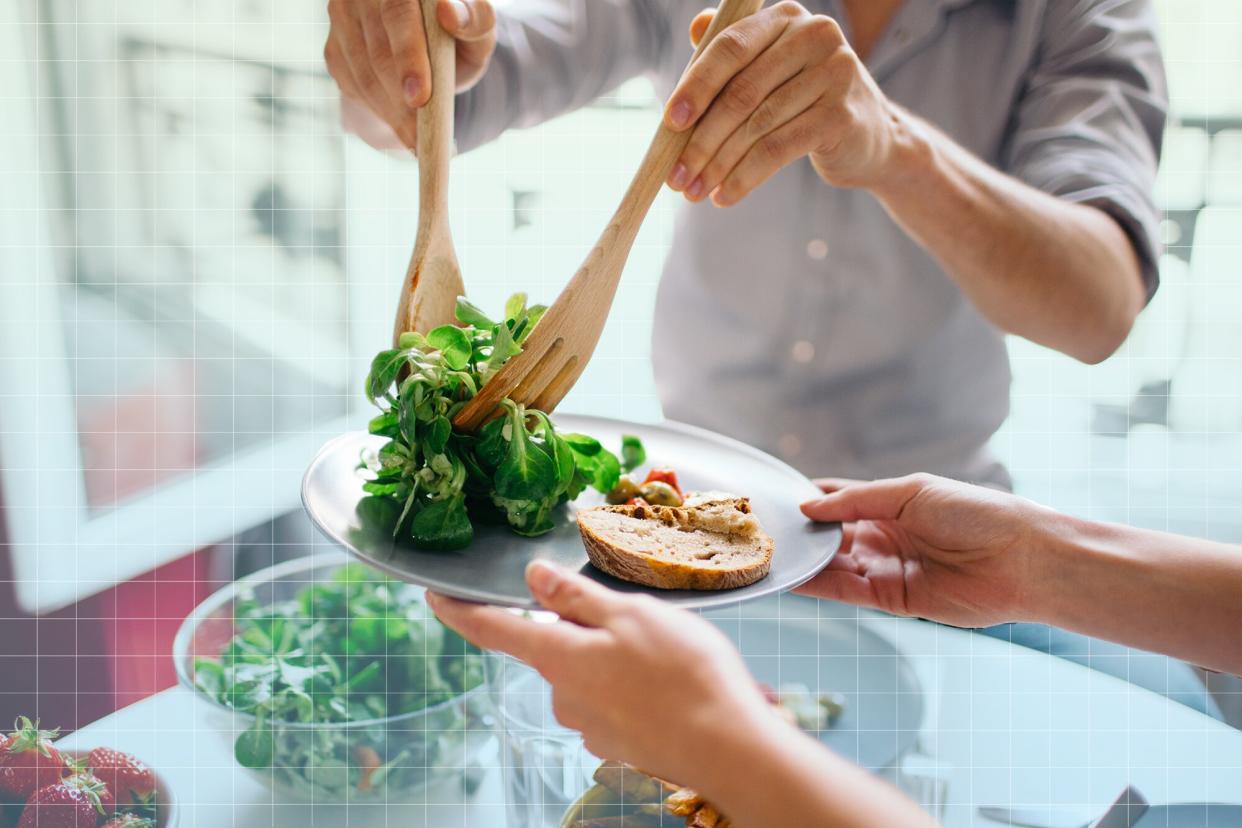6 "Polite" Things You Say When Someone Cooks for You That Are Actually Rude

Getty Images
Some things are better left unsaid. For example, complimenting someone's weight loss is never a good idea and often results in more negative implications than positive ones. But sometimes, it's the delivery of a comment where things go awry. Tone, timing and body language all contribute to the way remarks are perceived. When it comes to a personal endeavor, such as cooking, it's especially important to approach commentary in a gentle manner. Read on for six phrases to avoid next time someone cooks for you—and how to rephrase so your host feels validated in their efforts.
Related: 5 "Polite" Things You're Doing at the Farmers' Market That Are Actually Rude
1. This *actually* tastes good!
The key word in this backhanded compliment is "actually," which implies that you didn't anticipate the food your host prepared would taste good. Tossing in filler words like "actually" or "surprisingly" tends to disqualify your compliment, even if you meant well. Commending your host on the meal they worked hard to prepare is always a win; just be sure to steer clear of passive-aggressive phrasing and unnecessary words that could potentially offend.
2. What's the secret?
Asking for a recipe is a high compliment to your host (most won't mind sharing) because it means you enjoyed the meal enough to bring it into your own kitchen. But before you inquire about a secret ingredient or how to replicate a specialty, ensure they don't mind sharing. Akin to a treasured wooden salad bowl or an heirloom Dutch oven that's been passed down through generations, certain recipes are nostalgic, holding particular meaning, and may be a best-kept family secret! Making a recipe request when you're not sure of the context of the recipe could create an awkward moment.
Instead of straightforwardly asking for the recipe or secret, inquire about the story behind the dish. A good question to ask may be, "Where or from whom did you learn this recipe? It's delicious!"
3. This looks interesting.
This is the equivalent to calling your mom's new haircut "different." It's not the most reassuring sentiment. By definition, the word interesting doesn't have a negative connotation, but when it comes to complimenting a cook, it should be used sparingly. Saying a dish looks "interesting" or "adventurous" leaves your host wondering what you meant and may cause them insecurity. Even if the remark rings true, try opting for more supportive phrasing. Applaud the complex nature of the dish or thank them for the time they spent pulling it together. "Interesting" isn't a bad word, but when applied to home cooking, it may offend regardless of your intent.
Related: 6 "Polite" Dinner Party Habits You Don't Realize Are Actually Rude
4. I'm not hungry.
Sometimes it's inevitable. You lost track of time and ate a late lunch at work, meaning you're nowhere near hungry when dinnertime rolls around. But after your host has worked hard to prepare a meal for you, it's important to explain the situation to mitigate any false assumptions your host may formulate. Refusing food when you're not hungry feels awkward, but there are ways to make your host feel appreciated regardless of your lack of appetite. Try making a small plate of side dishes or grabbing a plate to save for later.
Related: How to Refuse Food Politely, According to an Expert
5. Use more [insert ingredient here] next time.
So, you're a kitchen maven and the friend everyone calls with questions about roasting a turkey and feeding sourdough starters. Despite your pro status, it's best to avoid offering your host unsolicited cooking advice that could potentially make them wonder if their culinary skills are in question. If they ask for feedback, by all means, offer your best constructive criticism! But, balance your solicited criticism with compliments, and take into account the disposition of your host. Maybe they're asking for your honest feedback, but really just want to be affirmed—don't we all!?
6. Is this healthy?
Tone makes or breaks this one. Depending on your approach, this could be perceived as either a complimentary question or a passive-aggressive remark. Vaguely asking your host if a meal they cooked is healthy could put them on edge or feed insecure thoughts that it's not up to par. However, if you have a diet to adhere to or specific food preferences, let your host know beforehand so they can prepare something you're sure to enjoy. Or offer to bring a dish of your own. But bluntly asking if a meal is healthy is unclear and may put your host in an uncomfortable position.
The Bottom Line
Complimenting your host on a meal they worked hard to prepare is always a good idea. But, there are some comments that just go better unsaid, plain and simple. Even if backed with good intentions, blunt remarks and questions may leave your host in an uncomfortable situation that could be averted with more gentle, complimentary phrasing.
Related: 6 "Polite" Things You Do at Trader Joe's That Are Actually Rude, According to a Former Employee

